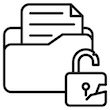
MOONLOGSFREE 493pcs uploaded by .boxed.pw
Breach Details
Description
We've been tracking an uptick in stealer logs appearing on Telegram channels, and what caught our attention wasn't the increasing volume, but the targeted nature of some of these dumps. Rather than broad sweeps of compromised user data, we’re seeing logs that appear focused on specific platforms or services. This latest example, which surfaced on a channel known for hosting collections of compromised credentials, illustrates that trend. The log file, uploaded by a user with the handle ".boxed.pw," contained a relatively small number of records, but the data within pointed to a focused scraping effort against **MOONLOGSFREE**.
MOONLOGSFREE Users Exposed in Stealer Log Dump
A collection of 493 files was uploaded on September 23, 2023, by a user identified as .boxed.pw. While the total number of files initially appeared substantial, closer inspection revealed that only 144 records contained unique user credentials. The exposed data included email addresses, plaintext passwords, and associated URLs, providing a direct path to potential account takeover. What made this stand out was the clear targeting of MOONLOGSFREE, suggesting a specific interest in the platform's users or data.
The breach was discovered when the Darkwatch team identified the file within a Telegram channel known for hosting stealer logs. The data's structure, with clear indicators pointing to MOONLOGSFREE accounts, raised immediate concern. The use of plaintext passwords is an egregious security lapse, indicating a vulnerability on the platform’s side that dramatically amplified the risk to its users. The relatively small size of the breach, coupled with the specific targeting of MOONLOGSFREE, suggests a focused effort rather than a broad compromise.
This incident highlights the continued threat posed by stealer logs, which are often the result of malware infections on individual devices. These logs are then aggregated and sold or shared on platforms like Telegram, creating a readily available resource for malicious actors. The MOONLOGSFREE breach serves as a reminder that even smaller platforms can become targets, particularly if they offer access to valuable data or services. This also underscores the critical importance of proper credential management and secure coding practices, especially the avoidance of storing passwords in plaintext.
Key point: Total records exposed: 144
Key point: Types of data included: Email Addresses, Plaintext Passwords, URLs
Key point: Source structure: Stealer log file (format unspecified)
Key point: Leak location: Telegram channel
Key point: Date of first appearance: September 23, 2023
While there has been no mainstream media coverage of this specific MOONLOGSFREE breach, the broader problem of stealer logs being traded on Telegram and other platforms is well-documented. Security researchers have repeatedly warned about the ease with which these logs can be obtained and the potential for widespread account compromise. For example, a recent report by BleepingComputer detailed how stealer logs are increasingly being used to bypass multi-factor authentication, further increasing the risk to compromised users.
Leaked Data Types
Email · Addresses · Plaintext · Password · Urls

AlbumWash
Breach Details
Description
We've been tracking a surge in older database leaks resurfacing on various dark web forums and Telegram channels. These aren't always new breaches, but rather collections of data from older, sometimes defunct, platforms. What really struck us about this latest dump wasn't the size – roughly 440,000 records – but the specific combination of data points and the unusual source: a website called MOONLOGSFREE, linked to the defunct music sharing site AlbumWash. The data had been circulating quietly, uploaded by user .boxed.pw, but we noticed a spike in mentions across several breach aggregation sites.
The MOONLOGSFREE/AlbumWash Breach: A Deep Dive
The leak appears to stem from a breach of AlbumWash, a music sharing website that is now defunct. The compromised data was uploaded to MOONLOGSFREE on January 1, 2024, and contains a mix of user credentials and IP addresses. What caught our attention was the presence of MD5 hashed passwords, an outdated and easily crackable security measure, suggesting the breach likely occurred some time ago, potentially during AlbumWash's active period. This highlights the ongoing risk posed by legacy systems and the importance of proper data disposal even after a service shuts down.
The breach matters to enterprises now because credential stuffing attacks are rampant. Even if AlbumWash is no longer active, the exposed email addresses and passwords can be used to target users on other platforms. This is especially concerning if users reused passwords across multiple accounts.
This aligns with a broader trend of attackers targeting older databases with weak security measures. The automation of credential harvesting and reuse makes these older leaks a valuable resource for malicious actors. The appearance of the data on Telegram channels further facilitates its distribution and use in attacks.
Key point: Total records exposed: 438,662
Key point: Types of data included: Email Address, Username, IP Address, Password Hash (MD5)
Key point: Source structure: Unknown, but uploaded as a single file by user .boxed.pw to MOONLOGSFREE
Key point: Leak location(s): MOONLOGSFREE, with mentions across various breach aggregation sites and Telegram channels.
External Context & Evidence
While there hasn't been widespread reporting on this specific MOONLOGSFREE/AlbumWash leak, the broader issue of exposed credentials from older breaches is well-documented. Security researcher Troy Hunt's "Have I Been Pwned" database regularly includes data from similar incidents, highlighting the persistent risk of credential reuse. Mentions of similar leaks and credential stuffing techniques are common on cybersecurity forums and threat intelligence feeds.
One Telegram post claimed the files were "another MD5 graveyard," emphasizing the outdated hashing algorithm used and the potential for cracking the passwords. This underscores the need for organizations to monitor for compromised credentials and implement multi-factor authentication to mitigate the risk of account takeover.
Leaked Data Types
Email · Address · Password · Hash · Username · Ip


/includes/qr-code.png)